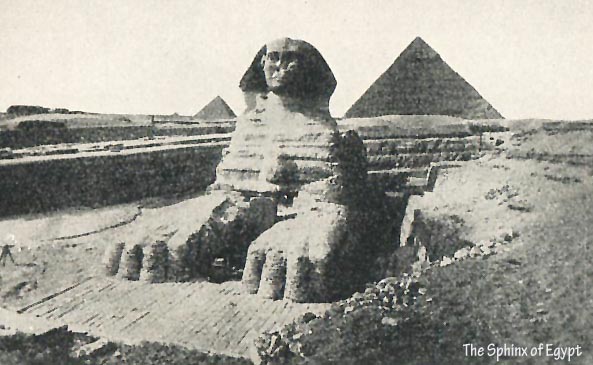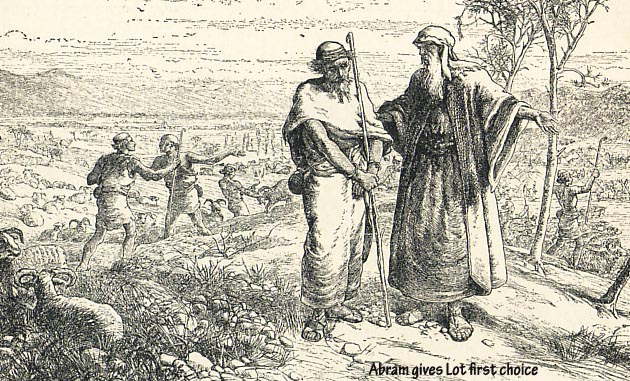
Stories From The Hebrew Bible
THE STORY OF A LONG JOURNEY

Stories From The Hebrew Bible
THE STORY OF A LONG JOURNEY
Not far from the city of Babylon, where they began to build the tower of Babel, was another city, called Ur of the Chaldees. The Chaldees were the people who lived in the country which was called Chaldea, where the two rivers Euphrates and Tigris came together. Among these people at Ur, was living a man named Abram. Abram was a good man, for he prayed to the Lord God and tried always to do God’s will.
But the people who lived in Ur, Abram’s home, did not pray to God. They prayed to idols, images made of wood and stone. They thought that these images were gods, and that they could hear their prayers and could help them. And as these people, who worshiped idols, did not call on God, they did not know His will and they did many wicked things.
The Lord saw that Abram was good and faithful, though wicked people were living all around him. So God spoke to Abram and said:
Abram, gather together all your family and go out from this place to a land far away, that I will show you. And in that land I will make your family to become a great people, and I will bless you and make your name great, so that all the world shall give honor to your name. If you will do as I command you, you shall be blessed, and all the families of the earth shall obtain a blessing through you.
Abram did not know just what this blessing meant that God promised to him. But we know that Abram’s family grew after many years into the Israelite people, out of whom came Jesus, the Savior of the world, for Jesus was a descendant of Abram: that is, Jesus came a long time afterward from the family of which Abram was the father; and thus Abram’s family became a blessing to all the world by giving to the world the Savior.
Although Abram did not know just what the blessing was to be that God promised to give him, and although he did not know where the land lay, to which God was sending him, he obeyed God’s word. He took all his family and with them his father Terah, who was very old, and his wife, whose name was Sarai; and his brother Nahor and his wife, and another brother’s son whose name was Lot; for Lot’s father, Haran, who was the younger brother of Abram, had died before this time. And Abram took all that he had, his tents and his flocks of sheep and herds of cattle, and went forth on a long journey to a land of which he did not even know the name.
He journeyed far up the great river Euphrates to the mountain region, until he came to a place called Haran, in a country called Mesopotamia, which means “between the rivers”; and this country was between the two great rivers Tigris and Euphrates. At Haran they all stayed for a time. Perhaps they stopped there because Terah, the father of Abram, was too old to travel farther, for they stayed at Haran until Terah died.
After the death of Terah, his father, Abram again went on his journey; and Lot, his brother’s son, went with him; but Nahor, Abram’s brother, stayed in Haran, and his family and children and children’s children, whom they call “his descendants,” lived at Haran for many years.
From Haran, Abram and Lot turned toward the southwest and journeyed for a long time, having the mountains on their right hand and the great desert on their left. They crossed over the rivers and climbed the hills, and at last they came into the land of Canaan, which was the land of which God had spoken to Abram.
This land was called Canaan because the people who were living in it were the descendants, or children’s children, of a man who had lived long before, whose name was Canaan. A long time after this it was called “the land of Israel,” from the people who lived in it; and because in that same land the Lord Jesus lived many years afterward, we now call it “the Holy Land.”
When Abram came into the land of Canaan, he found in it a few cities and villages of the Canaanites. But Abram and his people did not go into the towns to live. They lived in tents, out in the open fields, where they could find grass for their sheep and cattle. Not far from a city called Shechem, Abram set up his tent under an oak tree on the plain. There the Lord came to Abram, and said: “I will give this land to your children and to their children, and this shall be their land forever.”
And Abram built there an altar and made an offering and worshiped the Lord. Wherever Abram set up his tent, there he built his altar and prayed to God; for Abram loved God and served God and believed God’s promises.
Abram and Lot moved their tents and their flocks to many places where they could find grass for their flocks and water to drink. At one time they went down to the land of Egypt, where they saw the great river Nile. Perhaps they saw also pyramids and the Sphinx and maybe some other temples in that land, for many of them were built before Abram lived.
Abram did not stay long in the land of Egypt but traveled around until he came to a place near Bethel where he had first built an altar and there he again prayed to the Lord.
Now Lot, the son of Abram’s younger brother who had died, was with Abram; and Lot, like Abram, had flocks of sheep and herds of cattle and many tents for his people.

Abram’s shepherds and Lot’s shepherds quarreled, because there was not enough grass in one place for both of them to feed their flocks; and besides these people, the Canaanites were also in the land, so that there was not room for them all.
When Abram heard of the quarrel between his men and the men under Lot, he said to Lot:
Let there be no quarrel between you and me or between your men and my men; for you and I are like brothers to each other. The whole land is before us; let us go apart. You shall have the first choice, too. If you take the land on the right hand, then I will take the land on the left; or if you choose the left hand, then I will take the right.
This was noble and generous in Abram, for he was the older and could have claimed the first choice. Then, too, God had promised all the land to Abram, so that he could have said to Lot, “Go away, for this land is all mine.” But Abram showed a kind, good heart in giving Lot his choice of the land.
And Lot looked over the land and said, “I choose the whole plain of the Jordan.” It was the best land.
So, Lot and his family went down to the plain, with tents and men and flocks of sheep and cattle, leaving the rest of the land, which was not so good, to his uncle Abram.

Perhaps Lot did not know that the people in Sodom were the most wicked of all the people in the land; but he went to live near them and gradually moved his tent closer to Sodom, until after a time he was living in that wicked city.
After Lot had separated from Abram, God said to Abram:
Lift up your eyes from this place and look east and west and north and south. All the land that you can see, mountains and valleys and plains, I will give it to you and to your children and their children and those who come after them. Your descendants shall have all this land, and they shall be as many as the dust of the earth; so that if one could count the dust of the earth, they could as easily count those who shall come from you. Rise up and walk through the land wherever you please, for it is all yours.
Then Abram moved his tent from Bethel, and went to live near the city of Hebron, in the south, under an oak tree; and there again he built an altar to the Lord.